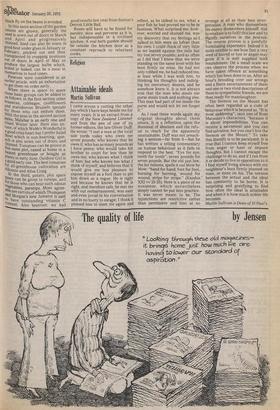Attainable ideals
Martin Sullivan
I came across a cutting the other day which I have kept beside me for many years. It is an extract from a copy of the New Zealand Listener and from the pen of one of its former editors, the late Oliver Duff. He wrote: "I met a man at the local sale yards today who owes me seven pounds; who knows that he owes it; who has as many pounds as I have pence; who would take his brother to court for less than he owes me; who knows what I think of him; but who knows too what I think of myself, and believes that it would give me less pleasure to expose myself as a fool than to pin him down as a rogue. He is right and because he knows that he is right, and therefore safe, he met me with out embarrassment, was easy and even jovial in his conversation and in no hurry to escape. I think it pleased him to meet me again and
reflect, as he talked to me, what a poor fish he had proved me to be in business. What surprised me, however, worried and'shamed me, was my discovery that my feelings as I talked to him were no loftier than his own. I could think of very little as we leaned against the rails but my lost seven pounds; and.as often as I did that I knew that we were standing on the same level with his boot firmly on mine. He had not only robbed me, he had reduced me, at least while I was with him, to thinking his thoughts and indulging his mercenary desires, and he somehow knew it. It is not always true that the man who steals our purse steals trash and nothing else. This man had part of me inside the purse and would not let me forget it."
As I read these words again my original thoughts about them return. It is a reflection upon the dismissal of idealism and the refusal to reach for the apparently unattainable. Duff was not preaching a sermon—far from it—but he has written a telling commentary on human behaviour as it fails to respond to the best. "Eye for eye, tooth for tooth", seven pounds for seven pounds. But the old just law, the lex talionis, spells it out blow by blow: "hand for hand, foot for foot, burning for burning, wound for wound, stripe for stripe." (Exodus XXI vv 23-25). Here is a piece of no nonsense, which nevertheless simply cannot be put Into practice. It was never meant to be. The injunctions are restrictive rather than permissive and hint at no revenge at all as their best interpretation. A man who dismembers his enemy dismembers himself. Not to retaliate is to fulfil this law and to dignify ourselves in the process. The reverse process is a painfully humiliating experience. Indeed it is quite terrible to see how fast a tiny seed of hatred or lust or anger may grow if it is well supplied with nourishment. On a small scale we can observe the process when we have taken offence at something which has been done to us. After an hour's brooding over our wrongs and a fierce entertainment of them and one or two vivid descriptions of them to sympathetic friends, we are then ready for manslaughter.
The Sermon on the Mount has often been regarded as a code of behaviour which is beyond us. "It is most saddening", says one of Rose Macaulay's characters, "because it is about impossibilities. You can receive a sacrament and you can find salvation, but you can't live the Sermon on the Mount." To take this literally is to be paralysed. It is true that I cannot keep myself free from anger or hate or impure thoughts, but I cannot escape the challenge to do so, and if I run from it or decide to live in opposition to it I find myself living always with my neighbour's boot firmly planted on mine, or mine on his. The tension between the actual and the ideal has constantly to be borne. It is surprising and gratifying to find how often the ideal is attainable and when it is how much nobler life becomes.
Martin Sullivan is Dean ID/St Paul's


























 Previous page
Previous page